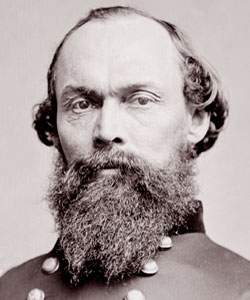Gordon Granger (American National Biography)
Scholarship
[Gordon] Granger's command of the Reserve Corps [of the Army of the Cumberland] was achieved despite opposition from some other commanders within the Army of the Cumberland. In Kentucky he had earned a reputation for being highly opinionated and for criticism of his superiors that verged on insubordination. General William Rosecrans, however, considered him a good fighter and named him commander anyway. This assignment provided the opportunity for Granger's most noteworthy accomplishment in the army, at the battle of Chickamauga on 20 September 1863, when he marched his corps to the relief of General George Thomas without orders and helped prevent the complete route of Union forces that day. For his performance, Granger was promoted brevet lieutenant colonel in the regular army, and when Thomas assumed command of the Army of the Cumberland, he rewarded Granger with command of the Fourth Army Corps.
Despite Granger's success at Chickamauga, his reputation continued to be a problem for him among his superiors. While his corps fought well at Chattanooga, Missionary Ridge, and in the relief of Knoxville, the decisive Granger seen at Chickamauga had disappeared. When Granger was sent to relieve Knoxville, Ulysses S. Grant ordered William T. Sherman to join him and assume actual leadership, because Grant did not believe Granger had the energy or the capacity for such a large mission.
Despite Granger's success at Chickamauga, his reputation continued to be a problem for him among his superiors. While his corps fought well at Chattanooga, Missionary Ridge, and in the relief of Knoxville, the decisive Granger seen at Chickamauga had disappeared. When Granger was sent to relieve Knoxville, Ulysses S. Grant ordered William T. Sherman to join him and assume actual leadership, because Grant did not believe Granger had the energy or the capacity for such a large mission.
Carl H. Moneyhon, "Granger, Gordon," American National Biography Online, February 2000, http://www.anb.org/articles/04/04-00431.html.



